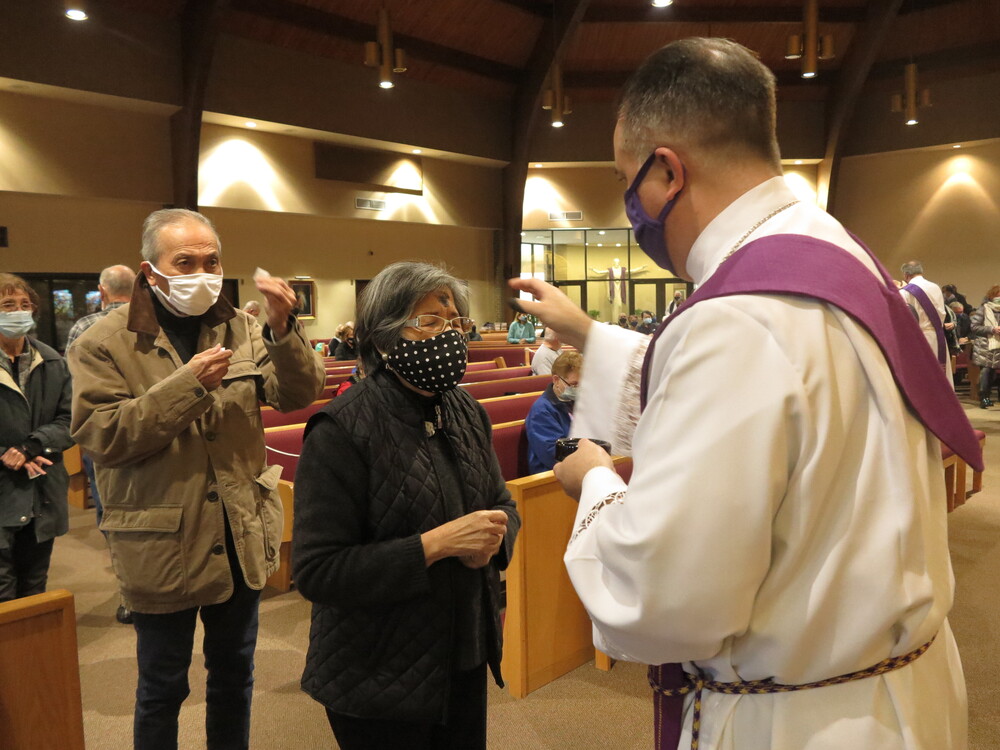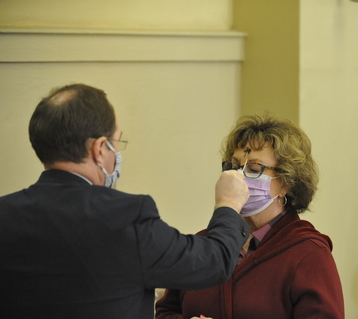
A platform that encourages healthy conversation, spiritual support, growth and fellowship

NOLACatholic Parenting Podcast
A natural progression of our weekly column in the Clarion Herald and blog

The best in Catholic news and inspiration - wherever you are!
With COVID safety first, ashes sprinkled or imposed on Ash Wednesday
-
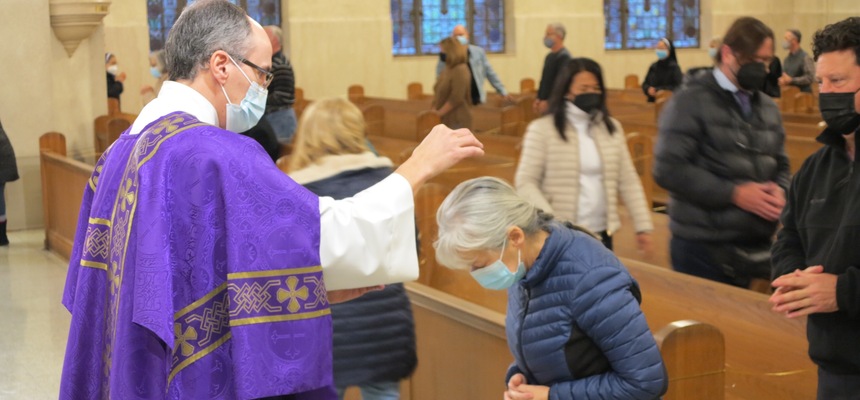
By Clarion Herald Staff
In this most unusual of times created by the coronavirus pandemic, Catholics in the Archdiocese of New Orleans received their traditional Ash Wednesday ashes in very non-traditional ways Feb. 17.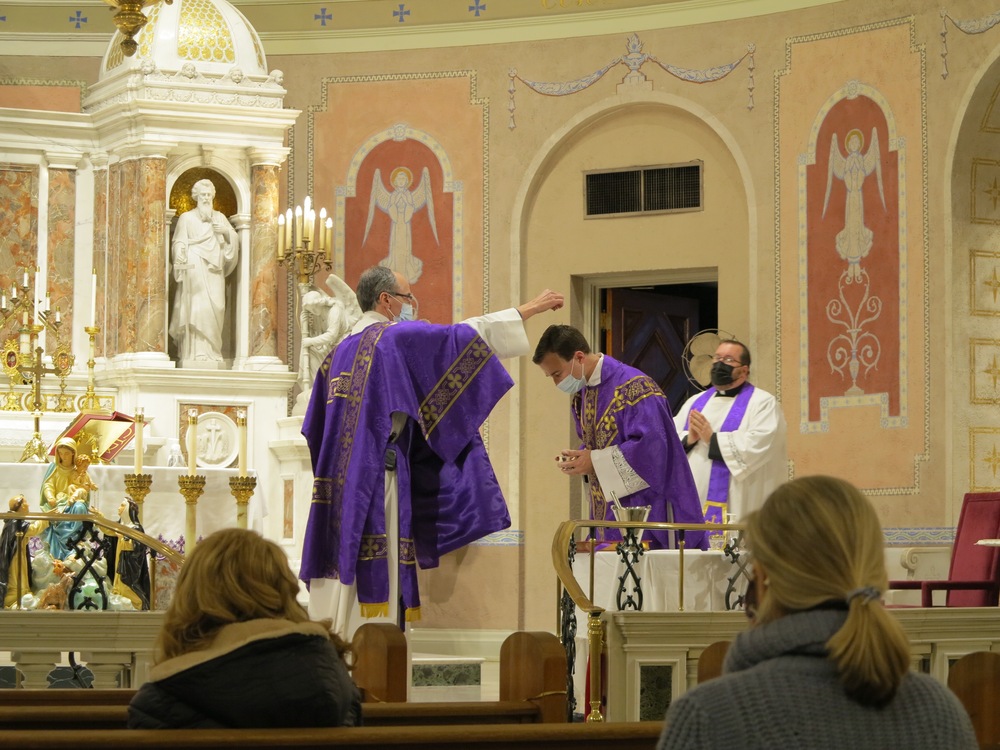
(Above: Our Lady of the Rosary Church | Photos by Beth Donze)
As a precaution against spreading COVID-19, Archbishop Gregory Aymond asked priests, deacons and other ministers to sprinkle a tiny pinch of blessed ashes on the top of the head rather than trace the sign of the cross with ashes on the forehead.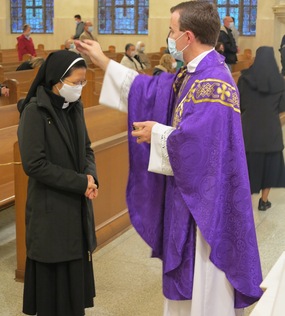
He also left room for other options, so how the ashes were distributed varied from church to church.At Our Lady of the Rosary Church in New Orleans, Father Colm Cahill and Deacon Ronald Drez Jr. used the sprinkling method during the 7 a.m. Mass. Father Cahill told congregants that on Ash Wednesday, the faithful “dive into the mystery of Lent” – a season of duality in which Catholics recognize their sinfulness yet are reminded that God is ever-ready to welcome back his repentant children.
Referring to the first reading from the Prophet Joel, Father Cahill said God never tires of granting forgiveness, asking people, “even now (to) return to me with your whole heart.”
“You and I accept that Good News through the ashes,” Father Cahill said. “We’re encouraged to recognize what those ashes mean – I recognize my brokenness; I recognize my need for grace; I recognize my need for redemption; I recognize my need for my savior.”
(Above: St. Clement of Rome Church | Photos by Christine Bordelon)
At St. Clement of Rome Parish in Metairie, sanitizing wipes were distributed as people entered church, and Massgoers wiped their foreheads before the ashes were applied in the usual way – with the thumb of a priest, deacon or extraordinary minister of holy Communion during its four Masses (one was in Spanish) on Feb. 17.Father Andrew Rudmann, who was the main celebrant of the 8:15 a.m., St. Clement’s pastor, Father Luis Rodriguez, Deacon Robert Pendzimaz and two extraordinary ministers of holy Communion distributed the ashes.
Father Rodriguez repeated the sentiment of the day’s Gospel in Matthew 6: 1-6, 16-18, that the ashes are not just for show.
“We all like the sign. We all want that visibility,” Father Rodriguez said. “What we fail to recall – it is not about getting ashes so people can see we are getting ashes. It’s a symbol or reminder that we need to give repentance. That’s the key – we make it different as a community. It’s a new beginning. It’s another call to repent and to change our lives and how we are going to grow closer to God and others.”
In his homily, Father Rudmann mentioned the difficulty of opening up to the Lord when we have been closed to his mercy and graces for so long through sin, which he described as a curling up into ourselves. Lent is a time for opening up to receive so much more.
“Fasting, prayer and almsgiving are methods (to use) so we can open up and be gifts for others,” Father Rudmann said. “How am I going to open up for Lent so I can be so much more for the Lord and my brothers and sisters?”
At St. Matthew the Apostle Church in River Ridge, congregants also received sanitizing wipes nand wipes their foreheads before receiving ashes in the traditonal way.
‘Long Q-tips’ used at cathedral
At St. Louis Cathedral, Archbishop Aymond, cathedral rector Father Philip Landry, Deacon Richard Brady and lay minister Brandon Briscoe used long Q-tips to place the ashes on individuals’ foreheads.In his homily, the archbishop said he picked up a sanitizing wipe in a foil wrapper that had a unique advertising message: “Wash away your sins. It has a heavenly scent. Devoutly wash away your wrongdoing. Check for stubborn guilt, and discard the sins with the wipe in a wastebasket. Go forth purified and moisturized.”
“As we know, as the people of God, as Christians, as disciples of Jesus, that’s not how it works, that’s not how we ‘wipe away our sins,’” the archbishop said, smiling. “Our forgiveness of sins is not done with a sanitizer wipe but rather because of the tender mercy and love of Jesus Christ.”
As he does at the start of Lent every year, the archbishop suggested that Catholics ask three questions of God: How does God view who we really are, with our virtues and faults? What one behavior or attitude can be the focus of our Lenten resolution? And what penance can specifically relate to that behavior or attitude to help us change?
“I can think of four, six, eight things that I can change in my life and in my heart, but, look we only have 40 days,” he said. “So, let's pick one that we really believe that Jesus is asking us to look at and change.”
(Above: St. Louis Cathedral | Photos by Peter Finney Jr.)
– Team reporting by Christine Bordelon, Beth Donze and Peter Finney Jr.





